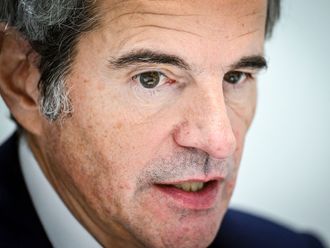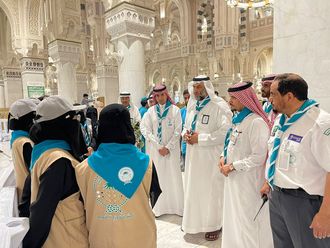Occupied Jerusalem: Israel's prime minister is to ask his Cabinet on Sunday to consider a package of security and diplomatic incentives, proposed by the US, to entice Israel to renew limits on colony construction and revive the moribund peace talks with the Palestinians.
The chief Palestinian negotiator has expressed strong reservations about the proposal because the 90-day moratorium on new construction would only apply to the West Bank and not occupied east Jerusalem, the Palestinians' hoped-for capital.
However, Saeb Erekat has, however, not rejected it outright, saying the Palestinians would consult amongst themselves and with Arab leaders.
The peace talks ground to a halt, just three weeks after they began at the White House, after Israel resisted US and Palestinian pressure to extend a 10-month moratorium on new construction in the West Bank that expired on September 26.
The Palestinians refused to return to the negotiating table if construction resumed on land they had ear marked for a future state, and gave the US until later this month to come up with a formula to salvage the talks.
The diplomatic climate soured even further last week, however, after Israel pressed ahead with plans to build 1,300 apartments in occupied east Jerusalem.
In a seven-hour meeting with Israeli Prime Minister Benjamin Netanyahu in the US last week, the US Secretary of State, Hillary Rodham Clinton, said that, in exchange for a new construction moratorium, the White House would ask Congress to sell Israel 20 stealth fighter jets, an Israeli official said.
The US is also willing to commit to fight international resolutions, which are critical of Israel or unilaterally advance the Palestinian quest for statehood, he said.
The official spoke on condition of anonymity, pending the presentation of the deal to the Cabinet on Sunday.
Under the proposal, the US has agreed not to seek a further extension of the building moratorium after it expires.
The idea is that the 90-day period would give the two sides time to work out an agreement on borders between Israel and a future Palestinian state, thereby making it clear where Israel can continue to build, and the areas in which it cannot.
Netanyahu is expecting stiff opposition to the US proposal from some members of his Cabinet, who take a hard line against territorial concessions to the Palestinians and have criticised him for waiting until the original moratorium was almost over to enter into peace talks.
It was unclear if any decisions would be taken at Sunday's meeting. Netanyahu, who has not publicly stated support for the proposal, presented it before an inner Cabinet of decision-makers on Saturday night.
Erekat, the Palestinian negotiator, said the Americans had not officially informed the Palestinians about the details of the proposal, but "they know we have a major problem in not including (occupied) east Jerusalem”.
The Palestinian President, Mahmoud Abbas, will now put the US plan before Palestinian decision-makers and call for an immediate session of Arab League officials before announcing an official decision, Erekat said.
Palestinians say construction in the West Bank and occupied east Jerusalem, even in areas Israel is expected to retain under a final peace deal, undermines the talks because it eats up land they want for their future state.
They have said that if negotiations fail they will consider sidestepping Israel and seek UN recognition of a Palestinian state.
According to the Israeli diplomatic source, the building freeze would apply to all new construction, which began in the West Bank after the moratorium expired on September 26.
Anti-colony watchdog, Peace Now, reported on Sunday that construction has begun on 1,649 apartments. That number includes the foundations of 1,126 apartments which have already been built. In 2009, the foundations of 1,888 houses were built in the West Bank.
"It turns out that the settlement (colony) freeze was no more than a 10-month delay in construction, and the settlers (colonists) managed to fill in the gap very fast," Peace Now said in a statement.
When the 10-month moratorium was originally announced, Netanyahu said it wouldn't be extended. On Sunday, colony leader, Naftali Bennett, predicted that the US pressure on Israel wouldn't stop, despite Washington's promise not to seek additional renewals of the moratorium beyond the current proposal.
"We are in a trap. They (the Americans) are pressuring us all the time," Bennett said. "If we don't reach an agreement on borders within three months, will the US stop pressuring us? Nonsense!"
The US incentives package was presented after a contentious week, in which the US repeatedly criticised Israel for pressing ahead with new colony construction in occupied east Jerusalem.
Netanyahu defiantly insisted that all of occupied Jerusalem, including the eastern sector, which was annexed in 1967 in a move not recognised by the international community, "is not a settlement (colony). It is the capital of the state of Israel".











